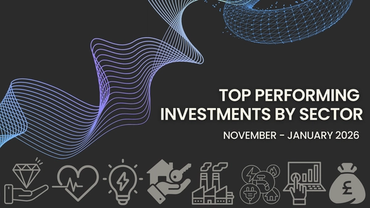5 ways Investment Trusts can supercharge your ISA in 2025
By Boring Money
6 Feb, 2025
This content is a paid promotion and has been created in collaboration with Lazard. It is an advertorial designed to promote Mid Wynd International Investment Trust plc. While we strive to ensure the information provided is accurate and relevant, it reflects the views and messaging of the sponsor.
When it comes to investing, few strategies are as powerful and tax-efficient as investing in a Stocks & Shares Individual Savings Account (ISA). Income - including dividends and interest - and capital gains from investments are completely tax-free in an ISA. Over time, this can boost the growth from investments thanks to the compounding effect - where your earnings generate their own earnings, as nothing is lost to tax.

Investors can put their money to work in shares of companies listed on stock exchanges, corporate bonds, government bonds, and investment funds. Funds include many distinct advantages, including the opportunity to diversify across regions and asset classes, access specialist markets, and reduce volatility, without the costs and complexities of managing individual securities.
But what type of investment fund should investors pick? Whether you’re an experienced investor reviewing your investment portfolio, or you’re just starting your journey and looking for inspiration, here are five compelling reasons to include Investment Trusts in your ISA in 2025.
1. Juice your income or choose growth
Investment Trusts often aim to provide higher dividend yields compared to other investment fund options, such as unit trusts or exchange-traded funds, making them appealing for income-focused investors.
Many Investment Trusts have explicit policies aimed at providing attractive and growing dividends – i.e., regular payments - to shareholders. These policies can include targeting higher-yielding investments and managing the portfolio to maximise income generation.
Furthermore, Investment Trusts can retain up to 15% of their income. Setting aside income in good years can allow them to pay out dividends in leaner years. This can help them provide more regular income streams.
Alternatively, some Investment Trusts focus on growth by investing in companies that reinvest their earnings for future expansion rather than distributing them to shareholders. These growth-oriented Investment Trusts target businesses with strong potential for capital appreciation, innovation, and market leadership.
Investors in these trusts may not receive regular income in the form of dividends but can benefit from significant capital growth over the long term as the value of their investments increases. This strategy is particularly appealing to those with a longer investment horizon who are seeking substantial growth and are willing to forgo immediate income for potentially higher long-term returns.
2. Harness the power of professional management
Investing can feel overwhelming, especially if you don’t have the time or expertise to monitor markets. That’s where Investment Trusts shine.
Managed by professional fund managers, Investment Trusts pool investors’ money into a diversified portfolio of assets. These managers use their expertise to make informed decisions, saving you time and effort while aiming to deliver strong returns that outperform the market.
Another perk of Investment Trusts is that they have an independent board of directors. It is their job to monitor the decisions of the fund managers and protect shareholders’ interests.
“One of the key benefits is the high level of accountability provided by an independent board of directors, who play a crucial role in overseeing the management and operations of the Investment Trust,” explains David Kidd, Chairman of the Board of Directors at the Mid Wynd International Investment Trust Plc.
“Ultimately, the board aims to maximise shareholder value and safeguard their investments. This may offer some much-needed reassurance to investors especially during turbulent and uncertain times.”
3. Diversification without the hassle
A well-diversified portfolio is a component of successful investing, but building one yourself can be tricky. That’s where Investment Trusts might make it easy.
These funds often have the flexibility to invest in a wider range of asset classes compared to other collective investment schemes, from stocks and bonds to property and even alternative markets. You can select a trust which reflects your investment goals, values, and risk appetite, while the built-in diversification spreads your risk and potentially reduces the chance of a nasty market dip wiping out the value of your portfolio.
“Within Investment Trusts, you can find an investment approach that resonates with how you want to invest, whether you are seeking growth, income, capital preservation, or a blend of these,” Kidd explains. “Mid Wynd International focuses on growth by investing in quality stocks, companies that generate high returns on capital and can reinvest that capital back into their business to grow into the future.”
“The portfolio aims for diversification across sectors, industries, regions, and competitive advantages,” Kidd adds. “The portfolio managers believe this is critical in delivering long-term performance.”
By holding Investment Trusts in your ISA, you’re essentially gaining access to a ready-made, professionally managed, and diversified portfolio - all while enjoying the tax-free benefits of an ISA. It’s an efficient way to reduce risk while maximising your growth potential.
4. Follow the beaten track
Investment Trusts often have long track records, providing a level of stability and trust that can be reassuring to investors. Many Investment Trusts have been around for decades, some even for more than a century. These long histories can provide a wealth of performance data and demonstrate a trust’s ability to pay dividends reliably, and navigate various market cycles and economic conditions.
Unique to Investment Trusts is their closed-end structure, which means they have a fixed number of shares. This allows fund managers to take a long-term view and ride out market gyrations, providing greater stability and potentially better performance during periods of market volatility.
Investors can buy or sell shares of the investment trust on the stock exchange, similar to trading individual stocks. However, the transaction costs associated with buying or selling shares are borne by the individual investor, rather than being spread across the fund, as is typically the case with open-ended funds.
5. A smart investment for uncertain times
In a world currently gripped by uncertainty and geopolitical turmoil, Investment Trusts – managed by experts and overseen by an independent board – could make an even more compelling investment opportunity.
The team behind Mid Wynd International believes the case for investing in a trust which focuses on quality investments with a long-term lens is prudent.
“We believe the Mid Wynd International Investment Trust is well suited to investors with a long-term investment horizon and an eye on quality growth,” says Kidd. “Companies that can generate high returns on capital and reinvest a significant portion of those returns back into their business to drive future growth should see their share price climb over time.”
“Right now, we believe quality companies present an attractive risk/reward compared to other options in the market, especially so given the path ahead still feels very much uncertain," explains Kidd.

---
Risks
The value of your investment may rise or fall, and your capital is at risk.
Certain information contained herein constitutes “forward-looking statements” which can be identified by the use of forward-looking terminology such as “may,” “will,” “should,” “expect,” “anticipate,” “target,” “intent,” “continue,” or “believe,” or the negatives thereof or other variations thereon or comparable terminology. Due to various risks and uncertainties, actual events may differ materially from those reflected or contemplated in such forward-looking statements.
The securities mentioned are not necessarily held by Lazard for all client portfolios, and their mention should not be considered a recommendation or solicitation to purchase or sell these securities. It should not be assumed that any investment in these securities was, or will prove to be, profitable, or that the investment decisions we make in the future will be profitable or equal to the investment performance of securities referenced herein. There is no assurance that any securities referenced herein are currently held in the portfolio or that securities sold have not been repurchased.
Any investment in an investment trust involves risk. You should be aware of the following risks when considering investing:
Past performance
Past performance is not a reliable indicator of future returns and does not guarantee future results.
The value of your investment
The value of shares, and any income from them, can fall as well as rise and investors may not get back the amount invested.
Market volatility risk
The value of the Company and any income from it can fall or rise because of movements in stock markets, currencies and interest rates, each of which can more irrationally and be affected unpredictably by diverse factors, including political and economic events.
Emerging and Developed Markets
Emerging and developing markets can face significant political, economic or structural challenges. The portfolio may experience delays in buying, selling and claiming ownership of investments and there is an increased risk that the portfolio may not get back the money invested.
Concentrated
In view of the concentrated nature of the portfolio, the level of risk is expected to be higher than for broader based portfolios and the value may be more volatile.
Smaller companies
Securities of smaller companies may be less liquid, and exhibit more volatile returns, than the securities of larger companies.
Currency risk
The Company’s assets may be priced in currencies other than the fund base currency. Changes in currency exchange rates can therefore affect the Company’s value.
Charges from capital risk
Where charges are taken wholly or partly out of the Company’s capital, distributable income may be increased at the expense of capital, which may constrain or erode capital growth.
Leverage risk
The Company may operate with a significant amount of leverage. Leverage occurs when the economic exposure created by the use of derivatives is greater than the amount invested. Leverage may result in large fluctuations in the Company’s value and therefore entails a high degree of risk including the risk that losses may be substantial.
Important Information
Shares in the Company are a form of equity investment.
This information has been issued and approved by Lazard Asset Management Limited (“Lazard”), 50 Stratton Street, London W1J 8LL. Lazard is investment manager to Mid Wynd International Investment Trust plc (the “Company”) and is authorised and regulated by the Financial Conduct Authority.
This is a marketing communication and does not in any way constitute investment advice or an offer or invitation to deal in securities.
Further information about the Company, including a Key Information Document, is available on the Company’s website www.midwynd.com.
Before investing, potential investors should also read the Company’s Investor Disclosure Document.
Forecasted or estimated results do not represent a promise or guarantee of future results and are subject to change. Past performance is not a reliable indicator of future results.
The value of investments and the income from them can fall as well as rise and you may not get back the amount you invested.
Investments in securities, derivatives and commodities involve risk, will fluctuate in price, and may result in losses.
Certain assets held in Lazard’s investment portfolios may trade in less liquid or efficient markets, which can affect investment performance.
There can be no assurance that the Company’s objectives or performance target will be achieved. Any investment is subject to fees, taxation and charges within the Company and the investor will receive less than the gross yield.
MSCI makes no express or implied warranties or representations and shall have no liability whatsoever with respect to any MSCI data contained herein. The MSCI data may not be further redistributed or used as a basis for other indexes or any other securities or financial products. This report is not approved, reviewed or produced by MSCI.
Further Information
Tax Rates
The tax treatment of each investor will vary, and you should seek professional tax advice. The contents of these materials are confidential and should not be disclosed other than to the person or persons for whom it is intended.
Regulation
The Company is listed on the London Stock Exchange and is not authorized or regulated by the Financial Conduct Authority.
Information Subject to Change
The information and opinions expressed here are as of the published date and are subject to change without notice.
Non-Mainstream Pooled Investment (NMPI) status
The Company currently conducts its affairs so that its shares in issue can be recommended by financial advisers to ordinary retail investors in accordance with the Financial Conduct Authority’s (“FAC’s”) rules in relation to non-mainstream investment products and intends to do so for the foreseeable future.
Shares in Mid Wynd International Investment Trust plc are excluded from the restrictions in the FCA rules which apply to non-mainstream pooled investment products, because they are shares in an investment trust.
The shares in the Company may also be suitable for institutional investors who seek a combination of capital and income growth.
Private investors should consider consulting an independent financial adviser who specialises in advising on the acquisition of shares and other securities, before acquiring shares. Investors should be capable of evaluating the risks and merits of such an investment and should have sufficient resources to bear any loss that may result.






